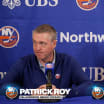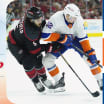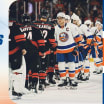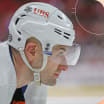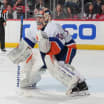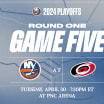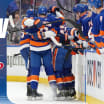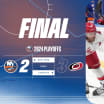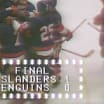You could cut the air of euphoria in the Madison Square Garden visitors' dressing room with an Islanders banner. It was that thick with joy.
Ecstatic.
Disbelieving.
Demanding.
That's how coach Al Arbour's skaters felt after defeating the Rangers in their first-ever playoff game on April 8, 1975.
Maven's Memories: Isles Upset Rangers in 1975
Stan Fischler looks back at the Islanders upset the Rangers for their first playoff series win
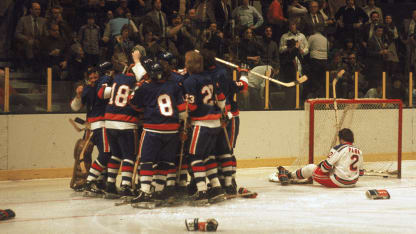
© Melchior DiGiacomo/Getty Images
By
Stan Fischler
Special to NHL.com
To many of the Nassaumen, the 3-2 come-from-behind victory over the Rangers seemed like a dream -- and for so many reasons; not the least of which was this was an unusually compacted, NHL streamlined series.
Of all things it was a best-of-three affair and all the Islanders needed was another win -- on April 10, 1975, only this time at Nassau Veterans' Memorial Coliseum.
"The sky's the limit," said Billy MacMillan, one of the celebrating Islanders.
Meanwhile, a chant bounced off the away dressing room with simply two words: "ONE MORE, ONE MORE!"
Some of the winning commentary had a more romantic aroma. Jean Potvin, who launched the comeback with the Islanders first goal, said it reminded him of his wedding.
"Other than getting married," Jean, the unofficial team humorist, blurted, "this win was the biggest thrill of my life."
In the wake of a triumph which required a comeback after the Rangers led 2-0 following two periods of play, "one more" victory seemed totally attainable.
Defenseman Ron Greschner, who had been fooled by Clark Gillies' maneuver that led to the Isles third period tying goal, was fit to be tied. Ron vowed that the Islanders would be punished -- and, naturally, lose -- in Game Two.
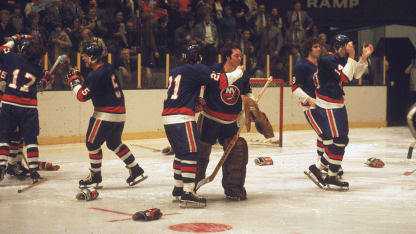
© Melchior DiGiacomo/Getty Images
As the first-game hoopla subsided, Bert Marshall, a former Ranger snapped up by Torrey in the expansion draft, sat in front of his locker and reminded some newsmen that the series was far from over. He pointed out that the Rangers would be a different team in Uniondale and that his mates should not expect an easy tilt.
"They're all going to be emotional games now," Bert said. "With two New York teams it's got to be that way."
Leaving the Garden hours after the Isles Game One win, each team went its separate way. As Tim Moriarty explained in his book, "The Incredible Islanders," some of the Islanders' wives had been waiting in a Garden corridor, hoping to drive them home.
"Arbour insisted that every player make the return trip in the team bus" noted Moriarty. "Nobody balked."
As the bus driver pointed his vehicle east toward the Queens-Midtown Tunnel, Torrey realized some sort of reward was in order. When the bus reached Second Avenue and 34th Street, he told the driver to stop. Bow Tie Bill had to make an eleventh hour purchase.
Moriarty: "Bill ducked into a deli and bought two cases of chilled beer, containers of milk and soda and rolls of salami and pepperoni for his thirsty, starving players."
By this time, the pundits had time to evaluate what had transpired a few hours earlier and then figure out when the next unexpected event would take place. They didn't have to wait very long.
Although future Hall of Famer Ed Giacomin was expected to take the Rangers into Round Two, his performance at the Garden was less than stellar; at least that was the judgement of coach Emile (The Cat) Francis, the Rangers coach.
Thus, Giacomin was benched for Game Two, replaced by tiny Gilles Villemure.
On the other hand, Al Arbour had no complaints about Glenn Resch, especially after Chico had hermetically sealed his net once Gillies put the Islanders ahead 3-2 in the third period.
For the Islanders, Game Two can best be described as a build-up-to-a-letdown. From my personal viewpoint, the only thing worth remembering about it was that Chuck Dolan had arranged for a second Islanders home telecast.
That was the good news. As for the game -- and the bad news -- Resch was knocked out of the box and Arbour's army lost the penalty-filled match, 8-3. Now they were forced to return to Manhattan for the third and final contest of the series.
"A lot of us told ourselves, 'If we're good enough to get this far, let's see what we can do about it in the showdown,'" Denis Potvin opined before Game Three. "Once again -- slowly but surely -- we began believing in ourselves."
Meanwhile, the respective coaches were thinking about goaltending. Al wanted Bill Smith to start the biggie while Francis stayed with his Game Two winner, Villemure, for the showdown.
Not surprisingly, The Garden was bulging at the seams with a capacity crowd of 17,500 of which perhaps two dozen were rooting for the visitors from Nassau.
If the Islanders were traumatized in this pressure-cooker situation, it was not evident on the ice. For startersSmith was, impenetrable.
The Islanders "Kid Lightning," Bob Bourne, high-stepped down the ice and found his buddy, Clark Gillies, in scoring position. Whoosh! Gillies' 25-footer beat Villemure from 25 feet at exactly 16 minutes of the opening frame.
End of One: 1-0 Visitors. The Garden natives were getting restless.
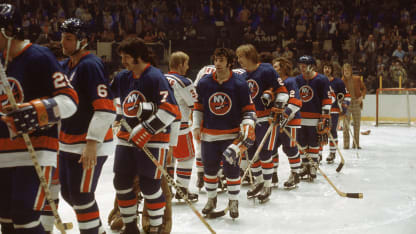
© Melchior DiGiacomo/Getty Images
Smith's tenacious -- and, so far, infallible -- goaltending distressed the Rangers crowd. So did Denis Potvin who alternated a power play and shorthanded goal to up the ante to 3-0 Islanders at the end of two periods.
Hoping a change would be for the better, Francis gave Villemure the hook and inserted the more emotional and experienced Giacomin.
"Right off the bat, Giacomin got into a fight with Garry Howatt," recalled Jean Potvin, "and it lit their fire."
Call it the dreaded three-goal lead -- or perhaps an MSG structural defect -- because the roof seemed about to fall in on the Islanders. One, two, three all red lights behind Smitty and the game was tied and the Isles were tottering toward playoff oblivion.
With machine-gun velocity, the Rangers pumped shots at Smith to gain the winning goal. As the years ahead would prove, Smitty was at his best when his team was at its worst. "I worked as hard as I ever worked in my life," Bill later remembered.
Try as they might, the Rangers could not put another puck behind Smith and Bill managed to get his weary mates where they wanted to be -- in the dressing room for a much needed respite.
They galumphed into the visitors' clubhouse and slumped onto the benches. They needed a boost from their leader and they got it, plain and to the point.
"When the overtime started," coach Arbour reflected, "I said we'd have to go for it."
His stickhandlers took Radar literally and the five starting skaters knew what was needed of them, the sooner the better.
Arbour's starting unit featured Westfall on the right side, Parise on the left with Drouin taking the face-off. Arbour had realized that each of them had been in overtime before. His defense featured the ever-dependable Marshall alongside the young, eager Lewis.
The starting forwards had a plan -- as much as anyone can blueprint a series-winning goal -- there was a method to their mechanism.
It all hinged on the opening puck-drop.
Westfall: "The three of us decided to throw caution to the wind. Still it all came down to the opening face-off and Jude won it for us. Then he sent it over to Bert who moved it on to Davey and then Davey got the puck to me."
All series Plan A had been to fire the rubber into the corner; didn't matter whether Giacomin went for it or not; but there always was that chance that he would. This time he didn't.
"I decided to fire the puck into the corner," said Westfall, "and see what happened."
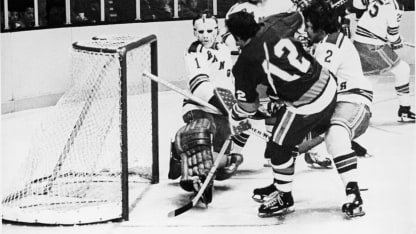
© B Bennett/Getty Images
What happened was that Rangers forward Steve Vickers was in a good, geographic position to clear the puck and relieve the Islanders zone pressure. Whatever brain-lock Vickers must have suffered was irrelevant to Drouin. Jude somehow beat the Ranger to the rubber.
"As soon as Davey dumped the puck, I raced in, got to it first and sent it right out to J.P. He had gotten around their defenseman Brad Park," Drouin said.
"J.P. was on Park's left so that when the puck came across the goal mouth, he was just behind Park and in a good position to get his stick on the puck. Giacomin didn't have a chance."
Apart from the series-clinching goal itself, Drouin remembered the stunned silence permeating the Garden, except for a small bloc of Islanders fans.
Drouin: "It was weird; a full house and about 30 people cheering like crazy for us"
The clock had registered 0:11 which made Parise's tension-breaking tally the fastest overtime goal in playoff history.
As Islanders players jumped off the bench, Arbour leaped as well; screaming in pain. The bench had landed on the coach's toe, nearly breaking it. But in this case, the joy of winning the series instantly erased any pain and even inspired humor as Radar viewed the crowd.
Arbour: "It was just like being in church; so quiet."
Perhaps the most emphatic postscript to this most stunning upset was authored by a New York Times reporter:
"The Rangers never really took the Islanders seriously -- until it was too late!"
No, it wasn't late for the Islanders; quite early as their immediate playoff future would prove.
Sure, the Blueshirts had been blitzed but now the Islanders moved up to a new threshold in the club's young life. The victors turned their playoff attention to Round Two and the Pittsburgh Penguins.
(NEXT WEEK: THE MAN BEHIND THE ISLANDERS RISE -- AL ARBOUR'S EARLY YEARS)

© Melchior DiGiacomo/Getty Images
LISTS: SEVEN KEYS TO THE ISLANDERS MONSTER UPSET
1. GOALTENDING:Chico Resch beat Ed Giacomin in Game One while Bill Smith topped the Rangers number one goalie in the deciding encounter after knocking Gilles Villemure out of the box.
2. HUSTLE: The series-winning goal was a product of Islanders forecheckers beating slow-footed Steve Vickers to the puck. This enabled Jude Drouin to play hockey's version of the "early bird catching the worm." Speedily, Drouin skimmed the rubber to Praise for the winner.
3. STRATEGY: Starting in Game One -- repeated in Game Three -- the Isles blueprinted a shoot-it-in-the Rangers-corner plan that concluded with the winning goal. In the end it didn't matter whether Giacomin went for the bait or not; he never stopped Parise's shot.
4. RESILIENCY: Backs to the wall, after blowing their third period three-goal lead, the Islanders bent but never broke. Thanks to Bill Smith they held off the Rangers long enough to gain a pre-overtime respite and then quickly dispatched the Blueshirts.
5. ARBOUR OVER FRANCIS: Although Emile Francis was a far more experienced coach than Al Arbour, The Cat couldn't cope with Radar's "Keep 'em off balance" blueprint. In the end Arbour got more out of his skaters than Francis.
6. THE DANDY DUET:Ever since J.P. Parise and Jude Drouin arrived on Long Island, their special Me-You chemistry continually paid off with wins, especially in the playoffs and, finally, the Jude-to-J.P. pass. "We celebrated forever," said Drouin. "We were proud because we gave the Islanders their first piece of hockey history."
7. THE YOUTH: Youngsters Clark Gillies, Bob Bourne, Lorne Henning, Denis Potvin and Bob Nystrom each played a noteworthy part in the final victory. Gillies set the Rangers back on their heels with the first goal while Potvin potted the next pair. The three-goal cushion proved a necessary buffer when the Rangers counterattacked.


